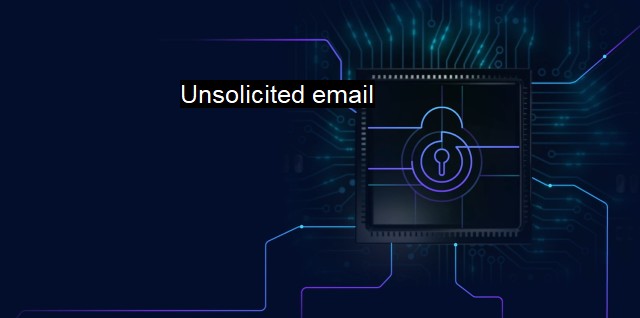What is Unsolicited email?
The Dangers of Unsolicited Emails: Protecting Against Malware, Phishing, and Cyber Attacks
Unsolicited email, often referred to as "spam" or "junk mail," is essentially any electronic mail that you receive without requesting or expecting it. It might be simply irritating or potentially harmful, depending on its intent and content. understanding how unsolicited email operates, its risks, and how to handle, remains an invaluable knowledge.Spam emails became prevalent with the rise of the internet and the prominence of email communications worldwide as a means of cost-effective and instant communication. Spam started as deflective annoyance with unwanted advertisements, chain letters, or dubious offers flooding email inboxes. Still, as the demands for cybersecurity grew, the gamut of unsolicited email threats also matured into phishing attempts, malware distribution, and deceptive fraud schemes. With such cyber threats arising from unsolicited emails, they pose significant risks not only for individual email users but businesses as well.
Unfortunately, malicious actors often use unsolicited emails as launch pads for more grave digital threats, like phishing attacks and malware spread. Phishing emails trick receivers into surrendering their personal or financial information by assuming the guise of a legitimate entity. Therefore, unsuspecting receivers get tempted to click the links or download attachments, permitting malware or viruses entering the system, which potentially leads to crippling data losses or ransomware attacks. Even more surreptitious are spear-phishing emails, crosshair targeted at particular individuals or companies, and significantly more skilled in incognito deceit.
Unsolicited emails may facilitate bots or cyber crooks to inject ransomware or Trojans into your digital environment. This malware could encrypt all your files, making them inaccessible unless a ransom gets paid to the attacker for decryption. Sometimes the malware could stealthily linger in your system, compromising your data integrity stealthily or even exploiting your machine as part of a botnet that conducts larger scale cyber crimes, resulting in substantial monetary and reputation loss.
In light of the prolific threats, tackling unsolicited emails is an integral component of flourishing cybersecurity strategies. Antivirus software has evolved to counter unsolicited emails effectively. In addition to providing real-time malware detection and elimination, advanced antivirus solutions offer email security features, where they automatically vet incoming emails and their attachments for harmful elements. Emails identified as spam are isolated, and any dubious interactions, such as URL clicks or downloads, blocked.
Also, sophisticated antivirus solutions can recognize phishing attempts, thanks to machine learning and Artificial Intelligence (AI) algorithms. Employee awareness plays a foundational role. Training them to recognize unsolicited emails, subsequent threats they expose, and actions to take when an unexpected email arrives, streamline cybersecurity efforts remarkably.
To sum it up, the phenomenon of unsolicited email goes beyond being a mere nuisance to posing severe cybersecurity risks. While advances in antivirus software have made strides in controlling the issue, navigating the digital landscape effectively requires users to be prudent and discerning, recognizing that not all that arrives via email is legitimate or harmless. Cybersecurity is, then, not merely a technological endeavor but also an exercise in educating and equipping email users to identify and respond appropriately to unsolicited mail threats.

Unsolicited email FAQs
What is unsolicited email?
Unsolicited email, also known as spam, is an unwanted and unsolicited email message that is sent to a large number of recipients without their consent or request.Why should I be concerned about unsolicited emails in terms of cybersecurity?
Unsolicited emails can contain malware or phishing scams that can pose a serious cybersecurity threat to your system. Opening links or attachments in these emails without proper caution can lead to identity theft, financial loss, or other security issues.How can I avoid receiving unsolicited emails?
To avoid receiving unsolicited emails, you can use spam filters or antivirus software. You can also avoid giving your email address to unreliable sources and refrain from replying or clicking on links in suspicious emails.What should I do if I receive an unsolicited email?
If you receive an unsolicited email, you should not open any attachments or click on any links. Instead, mark it as spam or junk, and delete it from your inbox. If you suspect that the email may contain malware, scan your system for viruses and malware using your preferred antivirus software.| | A | | | B | | | C | | | D | | | E | | | F | | | G | | | H | | | I | | | J | | | K | | | L | | | M | |
| | N | | | O | | | P | | | Q | | | R | | | S | | | T | | | U | | | V | | | W | | | X | | | Y | | | Z | |
| | 1 | | | 2 | | | 3 | | | 4 | | | 7 | | | 8 | | |||||||